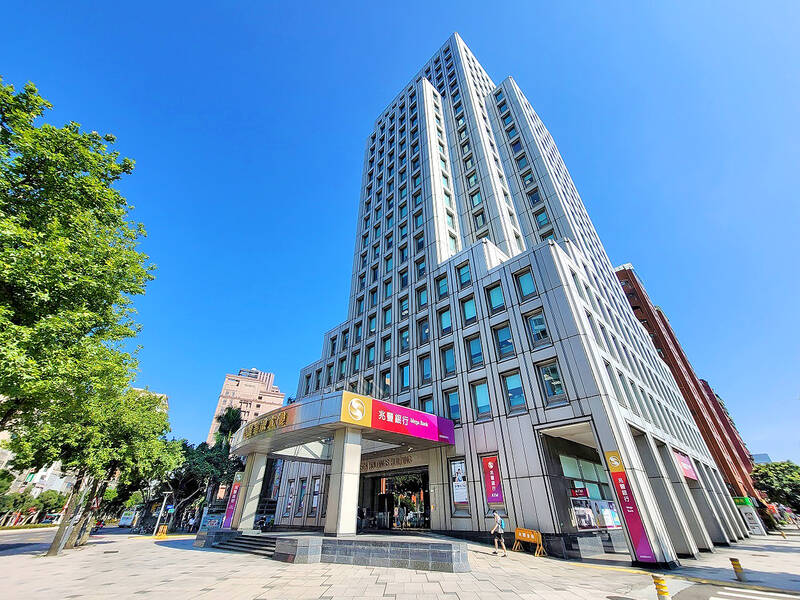State-run Mega Financial Holding Co (兆豐金控) is reportedly planning a second capital increase for its non-life insurance arm, Chung Kuo Insurance Co (兆豐產險), as losses from claims linked to COVID-19 insurance policies widen sharply.
The bank-focused conglomerate earlier announced it would participate in Chung Kuo’s capital increase of NT$2 billion (US$62.8 million) later this year to boost its capitalization.
Chung Kuo incurred a net loss of NT$3 billion in the first half of this year, with the losses likely to widen for the full year given still-sizeable outstanding pandemic policies.

Photo courtesy of Mega Financial Holding Co
The insurer last month set aside another provision of NT$2.7 billion to absorb losses from COVID-19-related claims, which have resurged after subsiding in previous months.
The extra provision is based on the assumption that 35 percent of the nation’s population would at some point contract COVID-19, unnamed sources said.
As of Tuesday, local COVID-19 cases had reached more than 6.9 million cases, or about 30 percent of the population.
Health experts now expect positive cases to reach 40 percent or even 50 percent, far above the 20 percent level on which Chung Kuo’s first capital increase was based, the sources said.
The first capital increase was intended to boost the non-life insurer’s risk-based capital to 300 percent, but the target appears untenable with COVID-19 infections spiking and a second capital increase inevitable, the sources said.
COVID-19 claim losses amounted to NT$6.6 billion as of Sept. 30 and could approach NT$10 billion, if positive cases continue climbing toward the end of the year, they said.
Mega Financial used its own money to fund the first capital increase, but would have to borrow through debt issuance or other means for the second fundraising, the sources said.
Taiwan Ratings Corp (中華信評) on Tuesday removed Chung Kuo’s ratings from the “CreditWatch” state with negative implications, as it believed the insurer’s capitalization would remain excellent for the next two to three years with the anticipated capital injection and strong support from its parent.
“These factors will help to absorb substantial claim losses on its COVID-19 pandemic insurance policies sold in the first half of 2022,” Taiwan Ratings said in a statement, affirming its “twAA” long-term financial strength rating and issuer credit rating for Chung Kuo.
Taiwan Ratings, a local arm of S&P Global Ratings, placed the company on the “CreditWatch” category on June 8.

RUN IT BACK: A succesful first project working with hyperscalers to design chips encouraged MediaTek to start a second project, aiming to hit stride in 2028 MediaTek Inc (聯發科), the world’s biggest smartphone chip supplier, yesterday said it is engaging a second hyperscaler to help design artificial intelligence (AI) accelerators used in data centers following a similar project expected to generate revenue streams soon. The first AI accelerator project is to bring in US$1 billion revenue next year and several billion US dollars more in 2027, MediaTek chief executive officer Rick Tsai (蔡力行) told a virtual investor conference yesterday. The second AI accelerator project is expected to contribute to revenue beginning in 2028, Tsai said. MediaTek yesterday raised its revenue forecast for the global AI accelerator used

Taiwan Semiconductor Manufacturing Co (TSMC, 台積電) has secured three construction permits for its plan to build a state-of-the-art A14 wafer fab in Taichung, and is likely to start construction soon, the Central Taiwan Science Park Bureau said yesterday. Speaking with CNA, Wang Chun-chieh (王俊傑), deputy director general of the science park bureau, said the world’s largest contract chipmaker has received three construction permits — one to build a fab to roll out sophisticated chips, another to build a central utility plant to provide water and electricity for the facility and the other to build three office buildings. With the three permits, TSMC

The DBS Foundation yesterday announced the launch of two flagship programs, “Silver Motion” and “Happier Caregiver, Healthier Seniors,” in partnership with CCILU Ltd, Hondao Senior Citizens’ Welfare Foundation and the Garden of Hope Foundation to help Taiwan face the challenges of a rapidly aging population. The foundation said it would invest S$4.91 million (US$3.8 million) over three years to foster inclusion and resilience in an aging society. “Aging may bring challenges, but it also brings opportunities. With many Asian markets rapidly becoming super-aged, the DBS Foundation is working with a regional ecosystem of like-minded partners across the private, public and people sectors

BREAKTHROUGH TECH: Powertech expects its fan-out PLP system to become mainstream, saying it can offer three-times greater production throughput Chip packaging service provider Powertech Technology Inc (力成科技) plans to more than double its capital expenditures next year to more than NT$40 billion (US$1.31 billion) as demand for its new panel-level packaging (PLP) technology, primarily used in chips for artificial intelligence (AI) applications, has greatly exceeded what it can supply. A significant portion of the budget, about US$1 billion, would be earmarked for fan-out PLP technology, Powertech told investors yesterday. Its heavy investment in fan-out PLP technology over the past 10 years is expected to bear fruit in 2027 after the technology enters volume production, it said, adding that the tech would